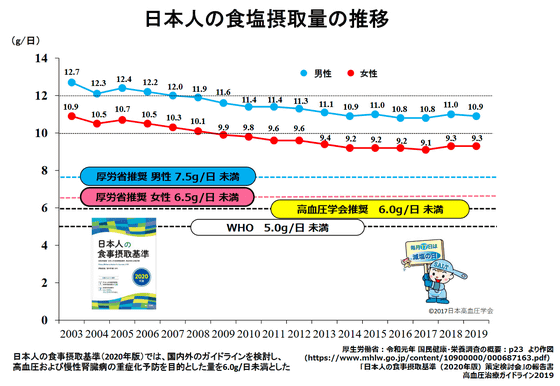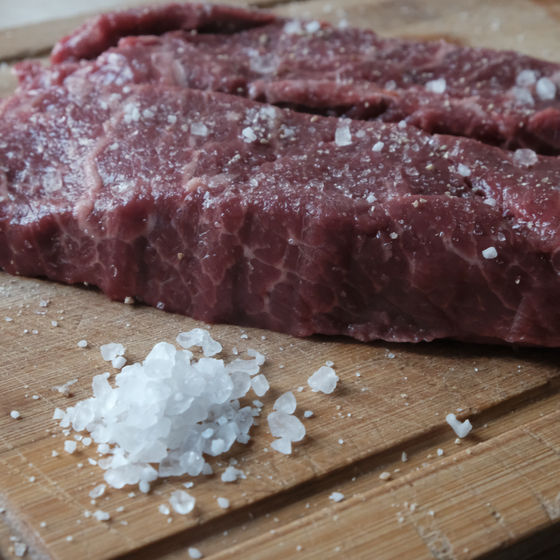Research results show that replacing salt with 'low sodium salt' reduces the incidence of stroke, etc.

Sodium contains sodium, a mineral that is essential for the human body, but it is said that taking too much salt increases the risk of high blood pressure, stroke, and heart disease. While some studies have shown that Japanese people consume too much salt, a new study found that 'low sodium salt' reduces the risk of stroke.
Effect of Salt Substitution on Cardiovascular Events and Death | NEJM
Landmark study shows simple salt swap could prevent millions of deaths each year | The George Institute for Global Health
https://www.georgeinstitute.org/media-releases/landmark-study-shows-simple-salt-swap-could-prevent-millions-of-deaths-each-year
Making 1 Simple Substitution For Table Salt Could Save Millions of Lives, Study Shows
https://www.sciencealert.com/making-1-simple-substitution-for-table-salt-could-save-millions-of-lives-study-shows
Salt is deeply involved in lifestyle-related diseases such as high blood pressure. We recommend a salt intake of 'less than', but Japanese people continue to take much more salt than these recommended values.
01. Document 1-2_Current status of salt intake in Japan and issues to promote salt reduction-Focusing on the efforts of the Japanese Society of Hypertension--- 000760248.pdf
https://www.mhlw.go.jp/content/10904750/000760248.pdf

Among the salt-related diseases, hypertension has research results that 'it gets worse when the intake of sodium is high' and 'it gets worse when the intake of potassium is insufficient'. For this reason, Professor Bruce Neal and colleagues at the University of Sydney's George International Institute of Health have replaced salt with 'low-sodium salt,' which replaces some of the sodium chloride contained in normal salt with potassium chloride. I investigated what kind of effect it would have on the human body.
Professor Neil and colleagues from 600 villages in rural areas of five provinces in China (Hebei, Liaoning, Ningxia, Shanxi, Shanxi) 'have a history of stroke' or 'over 60 years old and have high blood pressure. A total of 20,995 subjects were selected, with approximately 35 subjects in each village satisfying the condition of 'is.' The average age of participants is 65.4, with 49.5% being female. 72.6% had a history of stroke and 88.4% had a history of hypertension.
The research team divided these subjects into two groups, one group continuing to use low sodium salt and the other group continuing to use normal salt, and a 5-year follow-up study was conducted. During this follow-up, more than 3,000 had stroke and more than 5,000 had major cardiovascular events (a group of non-fatal stroke, non-fatal myocardial infarction, and cardiovascular death) and more than 4,000. Died.
These strokes, major cardiovascular events, and mortality are not unexpected given their age and medical history, but between subjects who were on low sodium salt and those who were on regular salt. There was a large difference in incidence and mortality. Strokes occurred at a rate of 29.14 per 1000 people who took low sodium salt, but the incidence of strokes at normal salt intake was 33.65 cases per 1000 people. The major cardiovascular events were 49.09 per 1000 low sodium salt intake and 56.29 per 1000 normal salt intake. Early deaths were 39.28 per 1000 low sodium salt intake and 44.61 per 1000 normal salt intake. Converted, low sodium salts result in a 14% reduction in stroke incidence, a 13% reduction in major cardiovascular events, and a 12% reduction in premature death.

In previous studies, not only was the effect of potassium chloride on stroke and the like unknown, but there was concern that hyperkalemia caused by excessive intake of potassium chloride would exacerbate the condition of people with chronic kidney disease. Did. However, this study not only reduced the incidence of stroke, etc., as mentioned above, but also said that hyponatremia increased the incidence of serious medical conditions caused by hyperkalemia. The result was not confirmed.
Professor Neil said that in the area surveyed, low sodium salt was $ 1.62 per kg (about 180 yen) and normal salt was $ 1.08 (about 120 yen) per kg, so there is no big difference in price, so there is no big difference in price, so stroke and stroke 'It's very cost-effective,' he said, given its impact on major cardiovascular events. He said switching from salt to low-sodium salts worldwide could even prevent millions of premature deaths each year, arguing that a low-sodium salt replacement policy should be pursued.
Related Posts:
in Food, Posted by darkhorse_log







